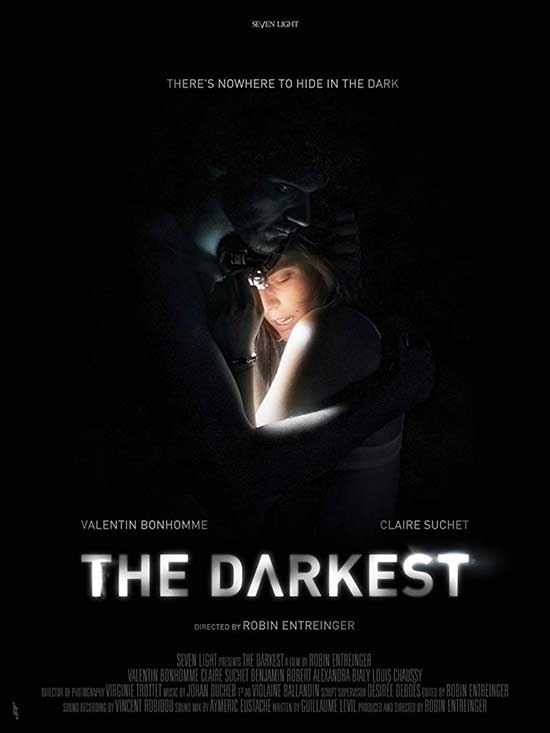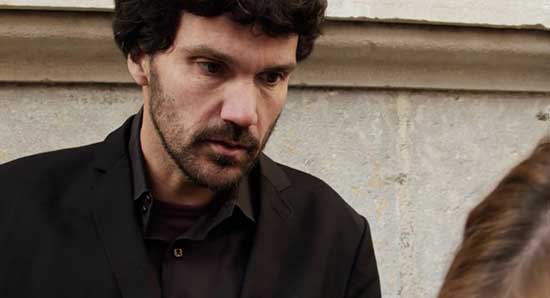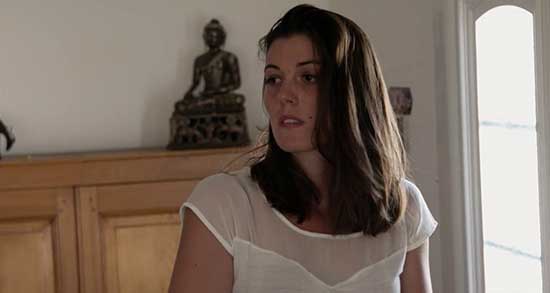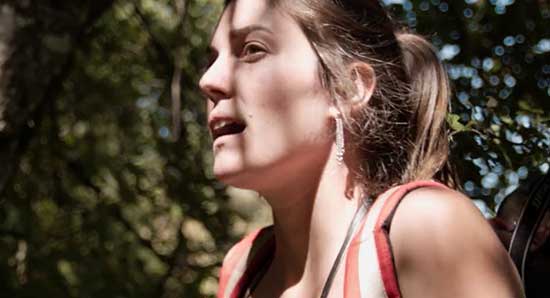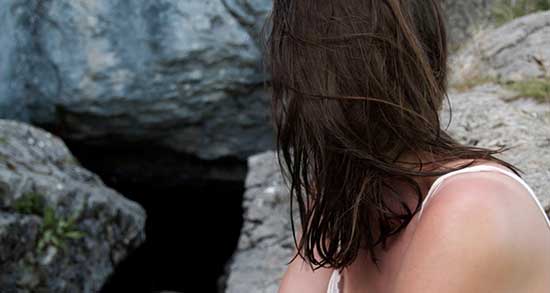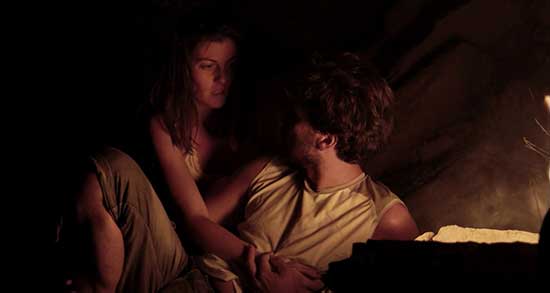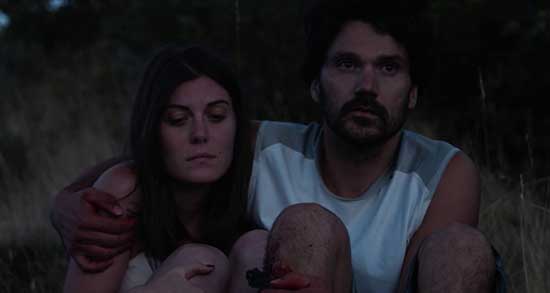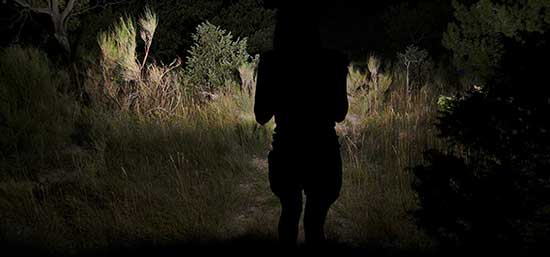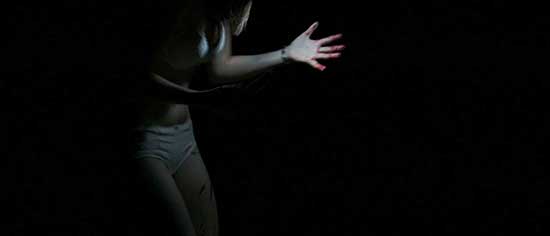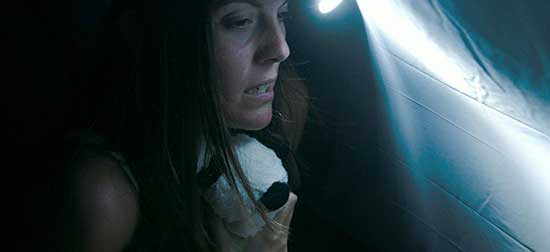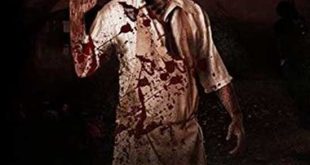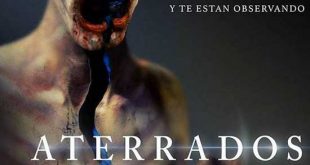SYNOPSIS:
A tent in the mountains, in the middle of nowhere. It was supposed to be a romantic weekend in the wild. But when darkness fell, it became a nightmare. They were not alone.
REVIEW:
“The Darkest” begins with a message that states the film should be watched in total darkness. How about you (meaning the film) try a little harder to con me into being set up for lame jump scares than that? Okay, maybe that was a bit premature? No. Definitely not. You can almost smell the pretentiousness before the first scene. Not a good sign.
Our leading male character is introduced. He has a look that reminds me of “Dark Shadows”-era David Selby. He is teaching a class about Schrodinger’s Cat concept using a real cat in a real box with a real knife. You want me to side with a potential cat killer? Why not roll Roman Polanski through a junior high school dance just for kicks?
We find out during a rather awkward conversation our guy has with the cat’s owner that he holds his wife in reasonably high regard just as his wife does him, and he rejects the freaky lady’s overtures. He also lets it slip that he and his wife will be hiking all weekend. With a runtime of only 67 minutes, they have to pack as much information and foreshadowing into the conversation as possible, even if it seems to cause the actors issues with delivering the lines. It’s noticeable even in French.
With the subtlety only the Europeans can bring to cinema, we are instantly shown our hero’s wife in bed with another man as she questions the intelligence of her university-professor husband. Ooh, the dichotomy of our characters! Of the two, the wife seems to be winning the “Least Sympathetic Character”, but the husband’s fussy way of holding a cigarette almost ties the race.
The two prepare for their trip. If we had not been told they are married, I would almost think they are on their first date. He questions everything she packs for their camping trip. If you’ve been married to this woman for years, you really shouldn’t be surprised by what she packs. She shouldn’t be so shocked or hurt that her husband treats her like a developmentally-challenged family member who is mostly tolerated. Maybe marriages in other countries are less intimate? I kind of doubt that. This just smacks of an attempt to show how disconnected the two are without considering how real people interact.
Any hope that things might improve once the couple hit the wilderness is derailed by the wife acting more and more like a French Kristen Stewart (pretty enough but lacking any real expression) and the husband comes across as a disinterested killer leading his prey to its slaughter. We even get a scene where the wife, Celine, stares in supposed fear that looks like boredom at the cave they are supposed explore. A cliched moaning/roaring sound comes from the darkness. After she has let the moisture in her mouth evaporate, a sharp musical sting accompanies the hand of Christophe, her husband, grabbing her shoulder as he flat-tones that they’ll be exploring the cave in the morning. He could be telling her that he is covered in epidermis for all the inflection he uses.
Two flat responses and a failed jump scare all during the one scene from which the emotional impact should ripple through the rest of the film. Curling into a fetal-like position is recommended at this point as it will allow you to conserve enough body heat to get you through the rest of the film.
From that limp effort, the film moves into an extended scene that feels lifted from “Willow Creek”. You know, that 20+ minute scene where you are doing nothing but watch two people improvise being scared mindless by the noises outside their tent? Fantastic stuff. Did not translate the transfixing terror from “Willow Creek”, just the setting. Celine is spazzing over noises. Chris is acting like she is silly. No tension. Merely two people you wish would have just stayed home.
The rest of the film is the director playing up to the gimmick of “total darkness” by having characters do things like using a camera flash to check on your surroundings in the dark. Before the first flash, you know you will see something in a flash that was not there in the last, and you get those at exactly the moments you expect there to be something there. Make no mistake about it; this is a gimmick, not a legitimate use of a cinematic technique.
Sorry, I need to tell someone something: Hey, John Krasinski! I got your sequel right here. Make the entire film from the perspective of a blind person attempting to survive in your nonsensical monster-filled world. That way you can manipulate your audience using two gimmicks. That ought to get you some more Golden Trailer awards.
Often, films like this tend to refuse to take a stand on what means what so that the viewer can take away their own taste of the film. That technique is fine when your plot makes sense, and any reasonable person can take the pieces given to them and put together what seems to be happening. “The Darkest” seems not to care if you are able to piece things together because you are handed a guessed-at explanation that really doesn’t add up based on what has gone before. One moment, only Celine is seeing and hearing things. If it had stayed that way, then we could assume guilt over the affair caused the mental break, but then Christophe starts seeing things that Celine does not. Why? Who knows? I mean, he acted almost like he had some plan in dragging his wife into the wilderness, but nothing comes of that.
“The Darkest” has an interesting general set up, but the “total darkness” gimmick paired with actors who can barely generate more emotion than the elementary Delsarte System of Bodily Expression (see note at end of review) can allow undermines and destroys the film. Maybe director Robin Entreinger can focus on creating a strong narrative structure before deciding to employ gimmicks to draw the audience into the film.
(Delsarte acting uses body poses to communicate thoughts, expressions, and feelings. When you think of the overly-stagy acting in the early 20th-century silent films, that is what I’m basically talking about. At one point, Celine does the “putting your hands to your mouth to express shock or terror” that I had not seen done outside of hokey stage melodramas and kindergarten plays.)
 Horror News | HNN Official Site | Horror Movies,Trailers, Reviews
Horror News | HNN Official Site | Horror Movies,Trailers, Reviews
